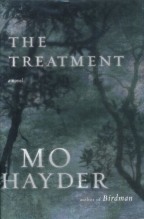The Treatment
Mo Hayder
Doubleday
US Hardcover First
ISBN 0-385-49695-8
358 Pages ; $23.95
Date Reviewed: 03-03-02
Reviewed by: Rick Kleffel

REFERENCES
COLUMNS
|
|
|
The TreatmentMo HayderDoubledayUS Hardcover FirstISBN 0-385-49695-8358 Pages ; $23.95Date Reviewed: 03-03-02Reviewed by: Rick Kleffel |
|
|
REFERENCES |
COLUMNS |
Horror novels come in all genres. If that sounds contradictory, consider that horror novels may be fully science fictional (such as the work of Neal Asher or John Shirley), supernatural (what we usually associate with horror) or even procedural mysteries (such as Thomas Harris' 'Silence of the Lambs'). Mo Hayder's first novel 'Birdman' was firmly in the Harris country: a serial killer with a twisted signature is caught by forensic detection and sheer luck. The derivative nature of the novel detracted from the characters, who were rather entertaining and carried the story when the author decided to show far more than most readers wanted to see. In 'The Treatment', Mo Hayder brings back moping Jack Caffery and his depressed girlfriend Rebecca, along with the far more sane DCI Souness. These characters, and the new ones she creates are fascinating and well drawn in 'The Treatment'. But this time Hayder takes up the subject of child molestation, and once again she draws a much clearer picture than most people need to or are willing to see. There are no limits in fiction. Hayder recognizes this but does not use it to her own advantage.
This is not to say that 'The Treatment' is not full of fine writing. It's certainly one of the most terrorizing novels to come down the pike in a long, long time. It is far more original than 'Birdman', in that it does not directly ape the plot of any of Harris' books. It's certainly a propulsive read, if you can get past the subject matter.
Therein lies the central problem with the novel. Hayder brings a great deal of skill and sensitivity to a subject most people don't want to know anything about, let alone see played out in gritty detail. 'The Treatment ' starts when a family is found imprisoned in their own home. Their child is missing. The question rapidly becomes who will be the next victim. Caffery and his team are assigned the case, in spite of Caffery's past.
Caffery's past includes the disappearance of his little brother Ewan, when Ewan was nine and Caffery was twelve. Once again, a nine-year-old boy is missing, and Caffery is certain the suspect in his brother's case knows something about it. As the threads of Caffery's past and the crime in the present wind together, Hayder builds up the tension past the point of bearability. If the reader weren't so put off by the graphic descriptions that Hayder provides, they'd be more frustrated with the obvious attempts at manipulation.
Even the graphic descriptions might be more bearable, if not acceptable, given the fantastic nature of Hayder's prose and characterizations. She draws Brixton as some dark urban, suburban, metropolitan hellhole, and does it so well the reader will see her descriptions of the parks and surrounding buildings lingering for days afterwards. As for characters, in 'The Treatment' Hayder creates the unforgettable Tracey Lamb, sister to one of the pedophiles in the novel. It's a sterling piece of gritty, intense, distressing writing, a full blown horror story character. Having done this, Hayder takes the story three steps past implausibility and horror. It's so awful that it neutralizes much of the good work that has come before it. It also diminishes some of the surprises that follow, and they are surprising. Hayder can create a decent mystery, but here it is defeated by the unpleasantness she wants to specialize in.
Any reader who might be disturbed or offended by graphic scenes of child molestation should not read 'The Treatment'. Those who enjoyed 'Birdman', and think that they can take Hayder's successful attempt to ratchet up the horror to 11 may still find some problems with Hayder's handling of the story itself. Once again, it is the background -- the characters and the prose -- not the story that make 'The Treatment' worthy of reading. I must admit that there were times when I thought I was not going to make it through the novel, which is most unusual for this dedicated reader. 'The Treatment' is a cure that for most readers, will be far worse than the disease.